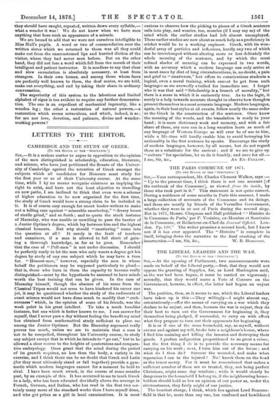LETTERS TO THE EDITOR.
CAMBRIDGE AND THE STUDY OF GREEK.
[TO THE EDITOR OF THE "SPECTATOR."]
Stu,—It is a serious matter to argue in opposition to the opinion of the men distinguished in scholarship, education, literature, And science, who have just petitioned the Senate of the Univer- sity of Cambridge against the retention of Greek amongst the subjects which all candidates for Honours must study for the first year or so of their University course. At the same time, while I by no means recognise existence as implying the right to exist, and have not the least objection to travelling on new paths, I am inclined to think that even were a scheme of higher education to be now organised for the first time, the study of Greek would have a strong claim to be included in it. It is of course easy enough for smart leader-writers to make out a telling case against "miserable smattering," "dreary hours of sterile grind," and so forth ; and to quote the stock instance of Macaulay, who was unable or unwilling to pass the barrier of a Junior Optime's degree, which lay between him and the highest classical honours. But why should " smattering " come into -the question at all ? It surely is the fault of teachers -and examiners, if a man is allowed to fall short of gain- ing a thorough knowledge, as far as he goes. Remember that the case of "Poll-men" is not under discussion. I should be perfectly ready to let the man who only wants a degree get his degree by study of any one subject which he may have a turn for. "Honour-men," however, especially the men in whose behalf the petitioners may be supposed particularly to plead— that is, those who have in them the capacity to become really -distinguished—must by the hypothesis be assumed to have minds worth the best training that can be given. In the case of Macaulay himself, though the absence of his name from the Classical Tripos would not seem to have hindered his career one jot, it may be questioned whether the study of the rudiments of exact science would not have done much to modify that " cock- sureness " which, in the opinion of some of his friends, was the weak point in his great intellect. To take a much humbler instance, but one which is better known to me. I can answer for myself, that I never pass a day without feeling the benefit my mind has obtained from mathematical study sufficient to place me among the Junior Optimes. But the Macaulay argument really proves too much, unless we are to maintain that a man is not to be compelled, throughout his University course, to study any subject except that in which he intends to "go out," but to be allowed a clear course to the heights of quaternions and compara- tive embryology. Once grant that the mind during the period of its growth requires, no less than the body, a variety in its exercise, and I think there can be no doubt that Greek and Latin (for they must ultimately stand or fall together) provide a gym- nastic which modern languages cannot for a moment be held to rival. I have been much struck, in the course of some months past, by an example of this. It has occurred to me to teach Greek to a lady, who has been educated decidedly above the average in French, German, and Italian, who has read in the first two cer- tainly many more of the standard works than I have myself done, and who got prizes as a gill in local examinations. It is most curious to observe how the picking to pieces of a Greek sentence calls into play, and wearies, too, muscles (if I may say so) of the mind which the earlier studies had left almost unemployed. These earlier studies are now about as much help as a proficiency in cricket would be to a working engineer. Greek, with its won- derful array of particles and inflexions, hardly any two of which can be interchanged without altering more or less delicately the whole meaning of the sentence, and by which the most refined shades of meaning can be expressed in two words, with an accuracy which a modern language can only arrive at in most cases by dint of long circumlocutions, is, no doubt, a pain and grief to " smatterers," but offers to conscientious students a logical, even a moral training, which cannot be got from such languages as are avowedly a tudied for immediate use. I forget who it was that said "Scholarship is a branch of morality," but there is a sense in which it is eminently true. As to the logic, it surely is a help towards accurate thought to observe how thoughts present themselves in a most accurate language. Modern languages, again, in their best styles at all events, follow nearly the same order as the Greek in the construction of the sentence. Once know the meaning of the words, and the translation is ready to your hand ; it is mere dictionary work and memory, and with a fair share of these, any man can in a long vacation learn as much of any language of Western Europe as will ever be of use to him, while a life-time will hardly enable him to avoid betraying his nationality in the first sentence he speaks. Encourage the study of modern languages, however, by all means, but do not regard them as a substitute for the ancient ; and if we are to give up " culture " for specialism, let us do it frankly, and once for all.—






































 Previous page
Previous page